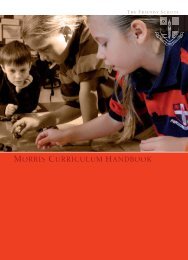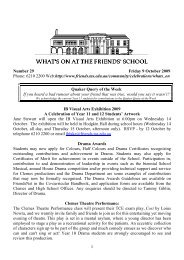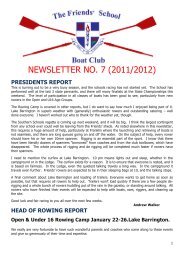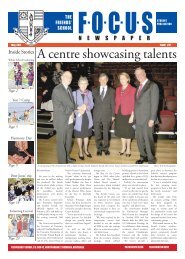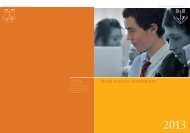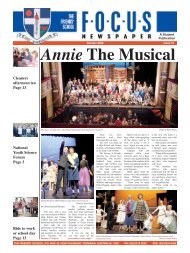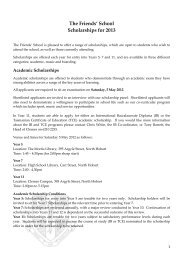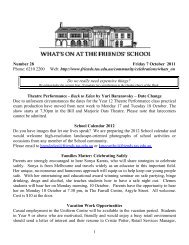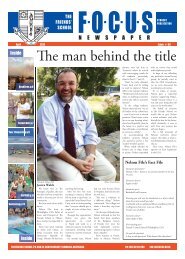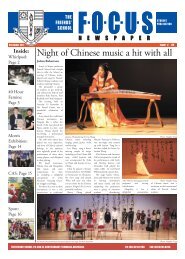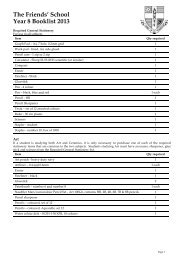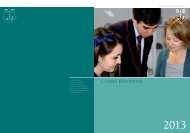Rowing Handbook 2013 - The Friends' School
Rowing Handbook 2013 - The Friends' School
Rowing Handbook 2013 - The Friends' School
You also want an ePaper? Increase the reach of your titles
YUMPU automatically turns print PDFs into web optimized ePapers that Google loves.
Please keep the ergometer area tidy:<br />
• Remove clothing items after use<br />
• Do not move ergometers from the designated area<br />
• Upon completion of your ergometer session, please wipe down the machine (especially the handle and seat)<br />
• Remove all drinking containers after use<br />
• Keep the music down to a level suitable for all other occupants of the building<br />
• Don’t forget to close and lock windows and doors after your session is finished<br />
Injury Prevention and Health<br />
As for all sports, rowing at times has its share of related injuries. If a rower is sick or injured, it is again vital that the<br />
coach is notified as soon as possible. In addition to notification:<br />
• In the case of an injury, an accident report form should be completed and lodged with either the <strong>School</strong> Office,<br />
the Head of Friends’ <strong>Rowing</strong> or the Operations Manager.<br />
• It is good practice to discuss the nature of the injury and the expected duration of it with the coach, who may<br />
be able to offer other training options<br />
Prevention of injuries is the best way of avoiding them, although things like blisters are part of the nature of the sport<br />
(they will pass with time). Good stretching, warming-up and staying warm and practicing good technique will reduce<br />
your likelihood of injury. A set of recommended warming up exercises is available from the Operations Manager on<br />
request.<br />
It is requested that any rower with a pre-existing medical condition inform both the coach and the Head of <strong>Rowing</strong> of<br />
the nature of the condition, the symptoms of deterioration of the condition and also preferred treatment or contact.<br />
<strong>The</strong>re is a section on the rower registration form which covers this.<br />
Nutrition Strategies for <strong>Rowing</strong><br />
Training Nutrition<br />
<strong>Rowing</strong> requires a unique mix of technique, power and endurance. Adolescent rowers have particularly high energy and<br />
carbohydrate requirements to support the physical demands of training and growth.<br />
Carbohydrate<br />
Carbohydrate is the body’s preferred fuel for our muscle and brain. Carbohydrate intake before, during and after<br />
exercise is important to meet the fuel requirements of exercise and ensure the best recovery (see below).<br />
Carbohydrate comes in many forms, but the smart rower will focus on foods containing carbs AND other important<br />
nutrients e.g. wholegrain breads and cereals, fruit, starchy vegetables, pasta, rice, milk, yoghurt, custard.<br />
Protein<br />
Adolescent rower’s require extra protein to assist in the repair and recovery process after exercise and ensure optimal<br />
growth. Aim for about 2 g protein per kg body weight per day (see table below).<br />
Each of the foods provides approximately 10g of protein.<br />
Animal Foods<br />
2 small eggs<br />
30g (1.5 slices) reduced fat cheese<br />
1 cup (250ml) milk<br />
35g lean beef, lamb or pork (cooked weight)<br />
40g chicken (cooked weight)<br />
50g grilled fish/canned tuna or salmon<br />
200g yoghurt<br />
150g Fruche<br />
1 cup custard<br />
Plant Foods<br />
4 slices (120g) bread<br />
3 cups (90g) wholegrain cereal<br />
2 cups (330g) cooked pasta<br />
3 cups (400g) cooked rice<br />
¾ cup (150g) lentils or kidney beans<br />
200g baked beans<br />
120g tofu<br />
60g nuts or seeds<br />
1 cup (250ml) soy milk<br />
100g soy ‘meat’<br />
Eating Before Early Morning Sessions<br />
After an overnight fast (sleeping) liver glycogen (energy) stores are substantially depleted. <strong>The</strong>refore, pre training<br />
carbohydrate intake is important for maintaining blood glucose levels during training sessions. For example, some fruit<br />
and a cereal bar on the way to training along with some water would be a good choice. If tolerating solid food before<br />
training is difficult a liquid meal alternative such as Up & Go, smoothie or even a glass of juice can be useful in<br />
providing essential carbohydrate.<br />
TFS-COC-L2-002, v 0.0.1 11



